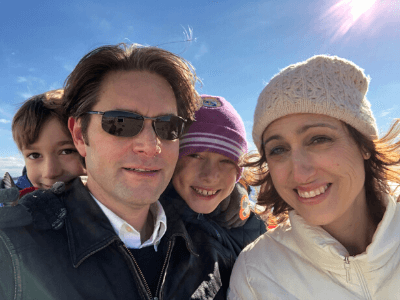
The lung cancer community mourns the loss of Laura Greco, a fierce advocate and inspiration to many, who passed away on April 22, 2023, at the age of 47. Laura’s journey with stage 4 lung cancer began in 2015, and her unwavering spirit and determination to live life to the fullest touched countless lives.
As a non-smoker diagnosed with ALK-positive lung cancer, Laura became a powerful voice for lung cancer awareness and research. Her Story of Hope highlights her participation in a clinical trial for an experimental MET inhibitor that extended her life, allowing her to continue her advocacy work and cherish time with her family. Laura’s legacy as an attorney, lung cancer patient advocate, and devoted mother of two will continue to inspire and drive progress in the fight against lung cancer.
How An Experimental MET Inhibitor Saved Laura Greco’s Life
A freak car accident – one that, by all rights, should have killed her – might have saved Laura Greco’s life. While driving home with her then six-year-old son from a ski lesson at the local mountain, she saw a car coming directly toward her. It was February 2015, a winter of epic snowfall, which created such narrow streets and high snow banks that there was nowhere for her to swerve her car. Miraculously, the impact created far more damage to the cars involved than it did to the people inside. Laura and her son were taken to the hospital to be checked out. He had a concussion while she underwent a full-body CT scan to check out her whiplash pain.
“We don’t see anything related to the accident, but you should get the mass in your chest checked out. It’s probably nothing.”
Neither Laura nor the doctors were terribly concerned. As a healthy 40-year-old with no risk factors, she was more shaken up by the accident than the mass in her chest.
“It’s probably nothing.”
A few days later, she developed issues with headaches and an inability to concentrate. She put in a call to her primary care physician. Not surprisingly, Laura had a concussion. That was the good news. The bad news: she also had a 3.7-centimeter mass in her lung. A biopsy would confirm this to be Non Small Cell Lung Cancer, stage 3A.
Laura quickly began a treatment plan consisting of 6 weeks of concurrent chemotherapy and radiation, followed by a lower lobectomy. Biomarker testing showed that her lung cancer was positive for both the ALK+ fusion (ALK) as well as MET amplification (MET). Although follow up testing showed a modest reduction in cancer cells, the lymph node involvement was concerning. Laura had active cancer in her chest and her disease had spread. Further chemotherapy treatment did the trick and for the next 15 months, Laura’s cancer was NED (no evidence of disease.)
Chemotherapy & Radiation Was Working – Until They Didn’t
In the fall of 2016, she began to experience neck pain and headaches – things she chalked up to her extensive travel schedule. A brain MRI revealed not only several metastases but significant swelling. After six weeks on medication specifically designed to target the ALK biomarker, she was able to celebrate an impressive 75% reduction in cancer cells. And she remained stable for all of 2017 and much of 2018. In July 2018, as new brain metastases began to show up. Laura underwent SRS radiation, and continued on oral medications, that pushed her back into stable territory.
In the summer of 2019, Laura began to experience symptoms associated with necrosis in the brain: a common side effect of radiation. By September, she began what she describes as a “slow decline.” Among her most bothersome symptoms, she suffered from lethargy, neck pain, and vomiting. Her decline was perplexing to her doctors.
“There is nothing worse than being really ill and not knowing what’s causing it. I knew something was very wrong with me.”
Finding Answers: The MET Biomarker
Following many fits, starts, and missteps, the root of her pain was ultimately determined. Laura’s body was quite literally shutting down from hydrocephalus – an accumulation of fluid around her brain. Over the next couple of months, she would undergo two brain surgeries during which surgeons were able to remove almost all of the malignant cancer cells. And, perhaps even more importantly, it was determined that it was the MET biomarker that was responsible for the growth.
In December 2019, Laura was the first person in the world to take a MET inhibitor (not currently FDA approved) together with the ALK inhibitor, which has proven to work well against brain metastases. Her January scans showed clear evidence that the drugs were working and in February of 2020, against all odds, Laura hit the slopes and skied for the first time since her diagnosis.
MET Inhibitor Makes Living With Lung Cancer a Reality
It is thanks to the rapid advances in lung cancer research that Laura is alive today. Because her biomarkers were first identified and then targeted with MET inhibitor, she is able to live a life of purpose and balance, spending time with her children and working tirelessly to advocate for lung cancer patients everywhere.

